Human Development Across Lifespan: Freud and Erikson Theories Impact
VerifiedAdded on 2022/10/01
|7
|1766
|72
Essay
AI Summary
This essay provides a personal reflection on human development across the lifespan, focusing on the impact of parental divorce during the author's pre-teen years. The analysis is grounded in Sigmund Freud's psychosexual development theory and Erik Erikson's psychosocial development theory. The essay explores how the author's experiences, including thumb sucking, potty training, and relationships with peers, relate to Freud's oral, anal, and phallic stages, and Erikson's stages of trust vs. mistrust, autonomy vs. shame/doubt, initiative vs. guilt, industry vs. inferiority, and intimacy vs. isolation. The author discusses how the emotional impact of the divorce influenced their relationships and sense of self, drawing connections between specific events and the theoretical frameworks. The essay concludes by highlighting the usefulness of both theories in understanding the psychological aspects of coping with divorce and explaining the author's reactions and behaviors during different developmental stages. References to supporting literature are also provided.
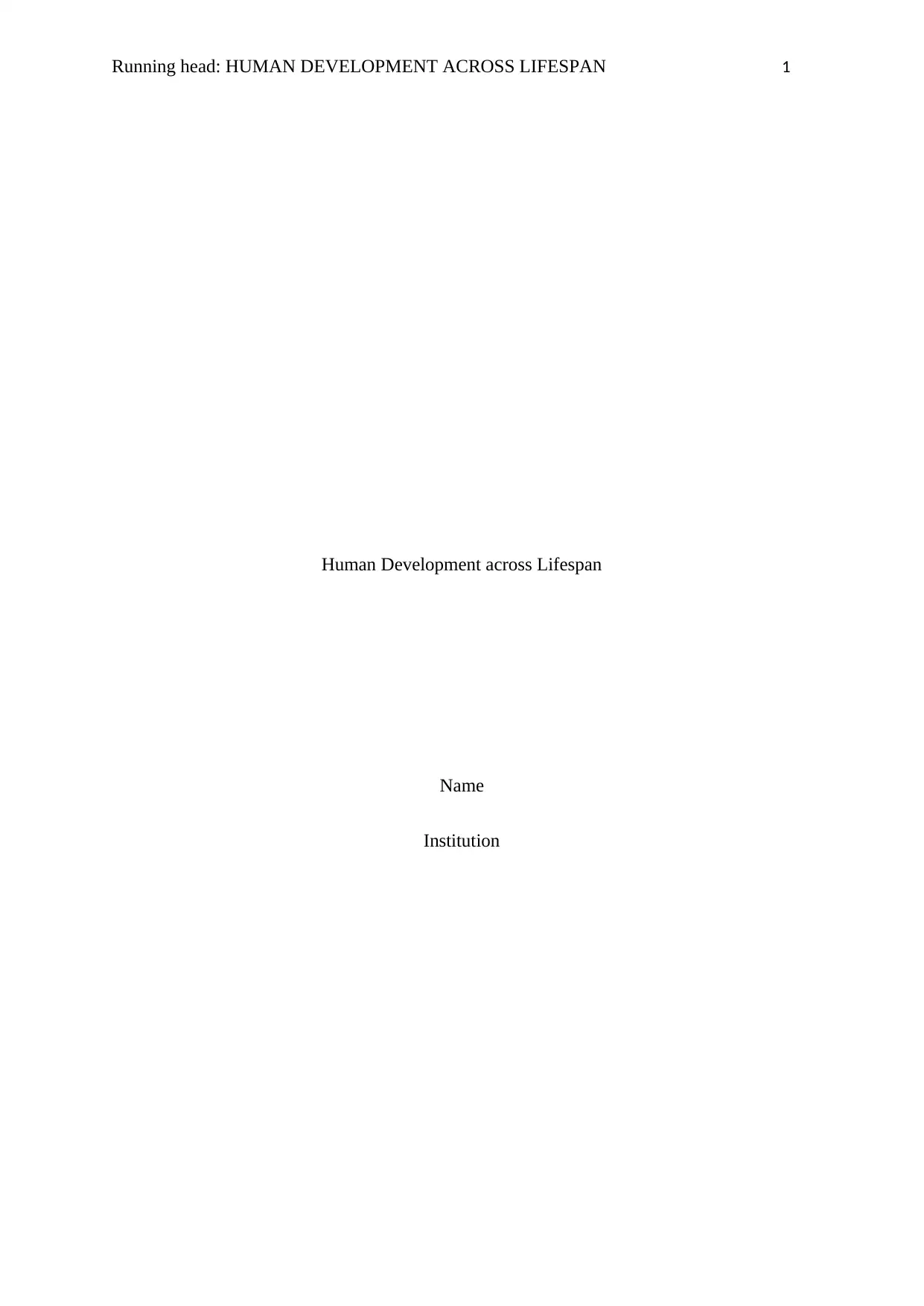
Running head: HUMAN DEVELOPMENT ACROSS LIFESPAN 1
Human Development across Lifespan
Name
Institution
Human Development across Lifespan
Name
Institution
Paraphrase This Document
Need a fresh take? Get an instant paraphrase of this document with our AI Paraphraser
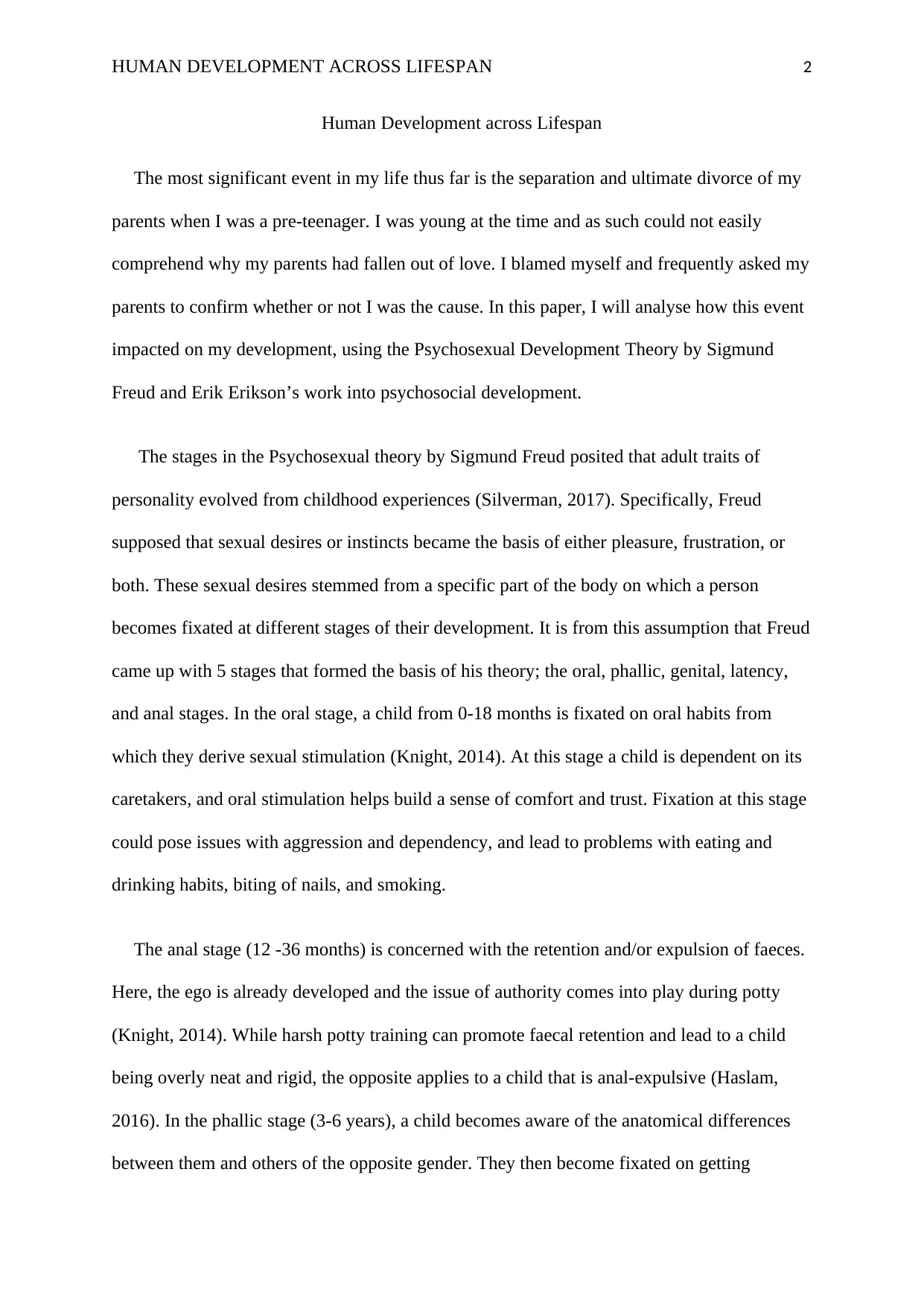
HUMAN DEVELOPMENT ACROSS LIFESPAN 2
Human Development across Lifespan
The most significant event in my life thus far is the separation and ultimate divorce of my
parents when I was a pre-teenager. I was young at the time and as such could not easily
comprehend why my parents had fallen out of love. I blamed myself and frequently asked my
parents to confirm whether or not I was the cause. In this paper, I will analyse how this event
impacted on my development, using the Psychosexual Development Theory by Sigmund
Freud and Erik Erikson’s work into psychosocial development.
The stages in the Psychosexual theory by Sigmund Freud posited that adult traits of
personality evolved from childhood experiences (Silverman, 2017). Specifically, Freud
supposed that sexual desires or instincts became the basis of either pleasure, frustration, or
both. These sexual desires stemmed from a specific part of the body on which a person
becomes fixated at different stages of their development. It is from this assumption that Freud
came up with 5 stages that formed the basis of his theory; the oral, phallic, genital, latency,
and anal stages. In the oral stage, a child from 0-18 months is fixated on oral habits from
which they derive sexual stimulation (Knight, 2014). At this stage a child is dependent on its
caretakers, and oral stimulation helps build a sense of comfort and trust. Fixation at this stage
could pose issues with aggression and dependency, and lead to problems with eating and
drinking habits, biting of nails, and smoking.
The anal stage (12 -36 months) is concerned with the retention and/or expulsion of faeces.
Here, the ego is already developed and the issue of authority comes into play during potty
(Knight, 2014). While harsh potty training can promote faecal retention and lead to a child
being overly neat and rigid, the opposite applies to a child that is anal-expulsive (Haslam,
2016). In the phallic stage (3-6 years), a child becomes aware of the anatomical differences
between them and others of the opposite gender. They then become fixated on getting
Human Development across Lifespan
The most significant event in my life thus far is the separation and ultimate divorce of my
parents when I was a pre-teenager. I was young at the time and as such could not easily
comprehend why my parents had fallen out of love. I blamed myself and frequently asked my
parents to confirm whether or not I was the cause. In this paper, I will analyse how this event
impacted on my development, using the Psychosexual Development Theory by Sigmund
Freud and Erik Erikson’s work into psychosocial development.
The stages in the Psychosexual theory by Sigmund Freud posited that adult traits of
personality evolved from childhood experiences (Silverman, 2017). Specifically, Freud
supposed that sexual desires or instincts became the basis of either pleasure, frustration, or
both. These sexual desires stemmed from a specific part of the body on which a person
becomes fixated at different stages of their development. It is from this assumption that Freud
came up with 5 stages that formed the basis of his theory; the oral, phallic, genital, latency,
and anal stages. In the oral stage, a child from 0-18 months is fixated on oral habits from
which they derive sexual stimulation (Knight, 2014). At this stage a child is dependent on its
caretakers, and oral stimulation helps build a sense of comfort and trust. Fixation at this stage
could pose issues with aggression and dependency, and lead to problems with eating and
drinking habits, biting of nails, and smoking.
The anal stage (12 -36 months) is concerned with the retention and/or expulsion of faeces.
Here, the ego is already developed and the issue of authority comes into play during potty
(Knight, 2014). While harsh potty training can promote faecal retention and lead to a child
being overly neat and rigid, the opposite applies to a child that is anal-expulsive (Haslam,
2016). In the phallic stage (3-6 years), a child becomes aware of the anatomical differences
between them and others of the opposite gender. They then become fixated on getting
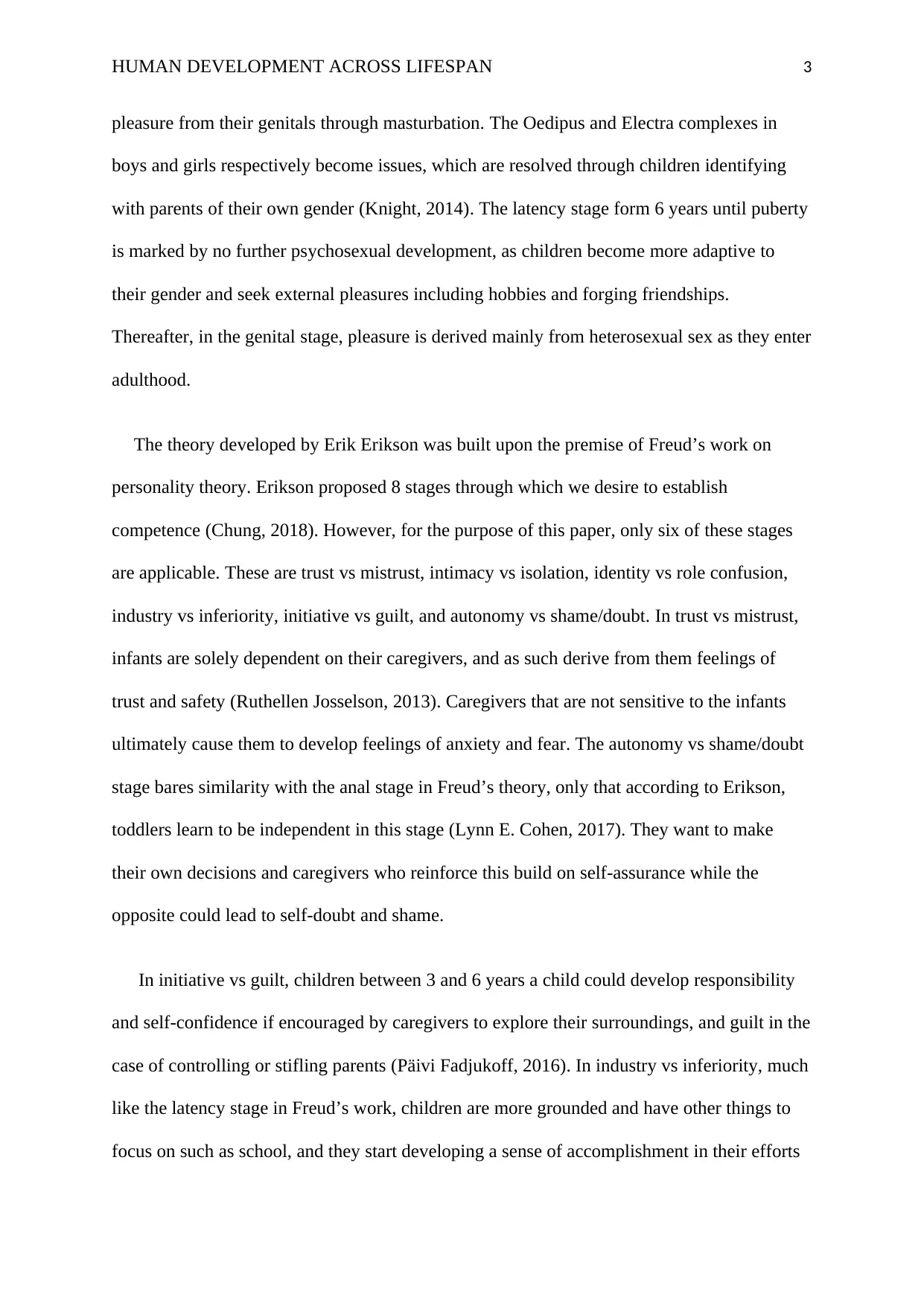
HUMAN DEVELOPMENT ACROSS LIFESPAN 3
pleasure from their genitals through masturbation. The Oedipus and Electra complexes in
boys and girls respectively become issues, which are resolved through children identifying
with parents of their own gender (Knight, 2014). The latency stage form 6 years until puberty
is marked by no further psychosexual development, as children become more adaptive to
their gender and seek external pleasures including hobbies and forging friendships.
Thereafter, in the genital stage, pleasure is derived mainly from heterosexual sex as they enter
adulthood.
The theory developed by Erik Erikson was built upon the premise of Freud’s work on
personality theory. Erikson proposed 8 stages through which we desire to establish
competence (Chung, 2018). However, for the purpose of this paper, only six of these stages
are applicable. These are trust vs mistrust, intimacy vs isolation, identity vs role confusion,
industry vs inferiority, initiative vs guilt, and autonomy vs shame/doubt. In trust vs mistrust,
infants are solely dependent on their caregivers, and as such derive from them feelings of
trust and safety (Ruthellen Josselson, 2013). Caregivers that are not sensitive to the infants
ultimately cause them to develop feelings of anxiety and fear. The autonomy vs shame/doubt
stage bares similarity with the anal stage in Freud’s theory, only that according to Erikson,
toddlers learn to be independent in this stage (Lynn E. Cohen, 2017). They want to make
their own decisions and caregivers who reinforce this build on self-assurance while the
opposite could lead to self-doubt and shame.
In initiative vs guilt, children between 3 and 6 years a child could develop responsibility
and self-confidence if encouraged by caregivers to explore their surroundings, and guilt in the
case of controlling or stifling parents (Päivi Fadjukoff, 2016). In industry vs inferiority, much
like the latency stage in Freud’s work, children are more grounded and have other things to
focus on such as school, and they start developing a sense of accomplishment in their efforts
pleasure from their genitals through masturbation. The Oedipus and Electra complexes in
boys and girls respectively become issues, which are resolved through children identifying
with parents of their own gender (Knight, 2014). The latency stage form 6 years until puberty
is marked by no further psychosexual development, as children become more adaptive to
their gender and seek external pleasures including hobbies and forging friendships.
Thereafter, in the genital stage, pleasure is derived mainly from heterosexual sex as they enter
adulthood.
The theory developed by Erik Erikson was built upon the premise of Freud’s work on
personality theory. Erikson proposed 8 stages through which we desire to establish
competence (Chung, 2018). However, for the purpose of this paper, only six of these stages
are applicable. These are trust vs mistrust, intimacy vs isolation, identity vs role confusion,
industry vs inferiority, initiative vs guilt, and autonomy vs shame/doubt. In trust vs mistrust,
infants are solely dependent on their caregivers, and as such derive from them feelings of
trust and safety (Ruthellen Josselson, 2013). Caregivers that are not sensitive to the infants
ultimately cause them to develop feelings of anxiety and fear. The autonomy vs shame/doubt
stage bares similarity with the anal stage in Freud’s theory, only that according to Erikson,
toddlers learn to be independent in this stage (Lynn E. Cohen, 2017). They want to make
their own decisions and caregivers who reinforce this build on self-assurance while the
opposite could lead to self-doubt and shame.
In initiative vs guilt, children between 3 and 6 years a child could develop responsibility
and self-confidence if encouraged by caregivers to explore their surroundings, and guilt in the
case of controlling or stifling parents (Päivi Fadjukoff, 2016). In industry vs inferiority, much
like the latency stage in Freud’s work, children are more grounded and have other things to
focus on such as school, and they start developing a sense of accomplishment in their efforts
⊘ This is a preview!⊘
Do you want full access?
Subscribe today to unlock all pages.

Trusted by 1+ million students worldwide
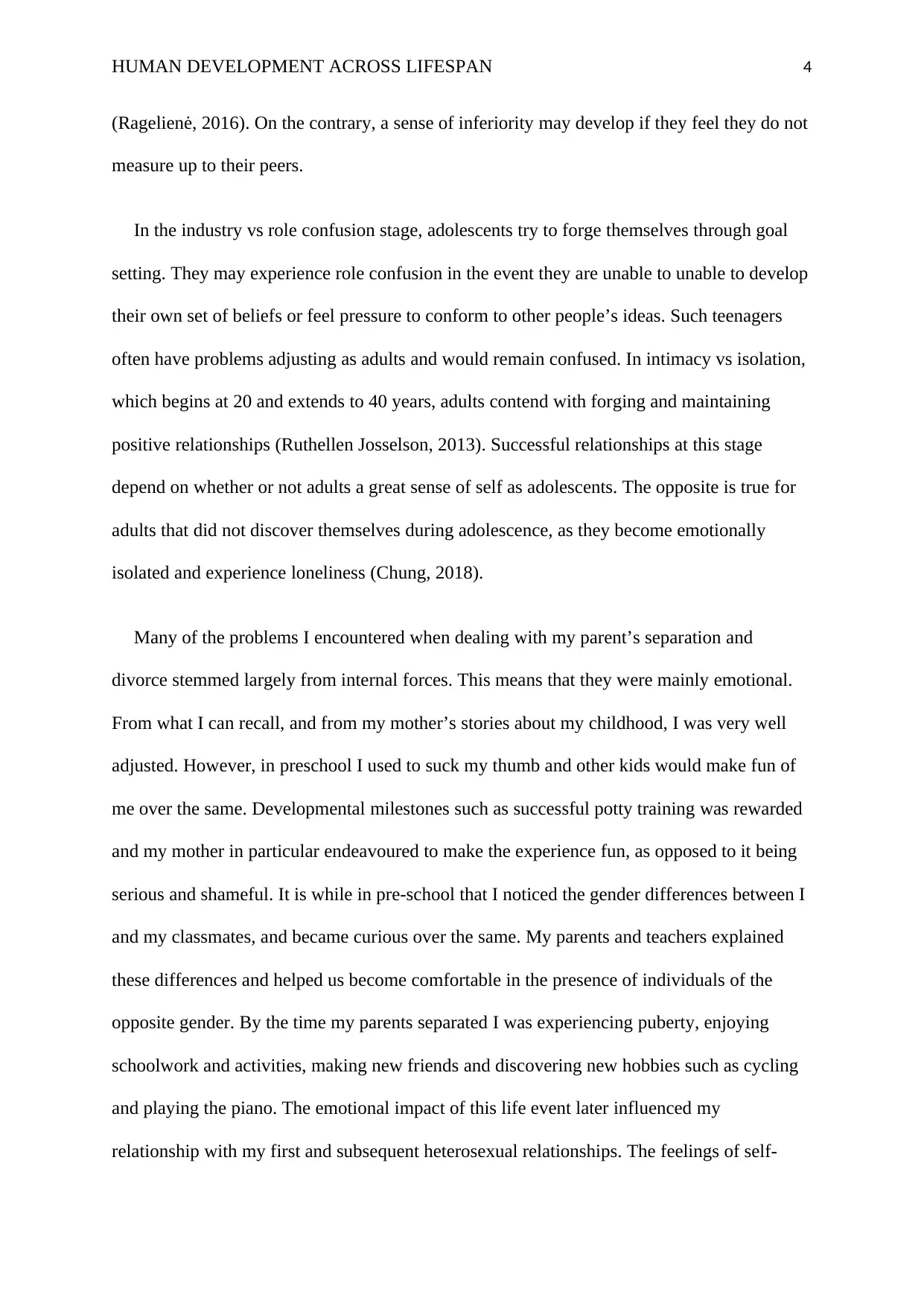
HUMAN DEVELOPMENT ACROSS LIFESPAN 4
(Ragelienė, 2016). On the contrary, a sense of inferiority may develop if they feel they do not
measure up to their peers.
In the industry vs role confusion stage, adolescents try to forge themselves through goal
setting. They may experience role confusion in the event they are unable to unable to develop
their own set of beliefs or feel pressure to conform to other people’s ideas. Such teenagers
often have problems adjusting as adults and would remain confused. In intimacy vs isolation,
which begins at 20 and extends to 40 years, adults contend with forging and maintaining
positive relationships (Ruthellen Josselson, 2013). Successful relationships at this stage
depend on whether or not adults a great sense of self as adolescents. The opposite is true for
adults that did not discover themselves during adolescence, as they become emotionally
isolated and experience loneliness (Chung, 2018).
Many of the problems I encountered when dealing with my parent’s separation and
divorce stemmed largely from internal forces. This means that they were mainly emotional.
From what I can recall, and from my mother’s stories about my childhood, I was very well
adjusted. However, in preschool I used to suck my thumb and other kids would make fun of
me over the same. Developmental milestones such as successful potty training was rewarded
and my mother in particular endeavoured to make the experience fun, as opposed to it being
serious and shameful. It is while in pre-school that I noticed the gender differences between I
and my classmates, and became curious over the same. My parents and teachers explained
these differences and helped us become comfortable in the presence of individuals of the
opposite gender. By the time my parents separated I was experiencing puberty, enjoying
schoolwork and activities, making new friends and discovering new hobbies such as cycling
and playing the piano. The emotional impact of this life event later influenced my
relationship with my first and subsequent heterosexual relationships. The feelings of self-
(Ragelienė, 2016). On the contrary, a sense of inferiority may develop if they feel they do not
measure up to their peers.
In the industry vs role confusion stage, adolescents try to forge themselves through goal
setting. They may experience role confusion in the event they are unable to unable to develop
their own set of beliefs or feel pressure to conform to other people’s ideas. Such teenagers
often have problems adjusting as adults and would remain confused. In intimacy vs isolation,
which begins at 20 and extends to 40 years, adults contend with forging and maintaining
positive relationships (Ruthellen Josselson, 2013). Successful relationships at this stage
depend on whether or not adults a great sense of self as adolescents. The opposite is true for
adults that did not discover themselves during adolescence, as they become emotionally
isolated and experience loneliness (Chung, 2018).
Many of the problems I encountered when dealing with my parent’s separation and
divorce stemmed largely from internal forces. This means that they were mainly emotional.
From what I can recall, and from my mother’s stories about my childhood, I was very well
adjusted. However, in preschool I used to suck my thumb and other kids would make fun of
me over the same. Developmental milestones such as successful potty training was rewarded
and my mother in particular endeavoured to make the experience fun, as opposed to it being
serious and shameful. It is while in pre-school that I noticed the gender differences between I
and my classmates, and became curious over the same. My parents and teachers explained
these differences and helped us become comfortable in the presence of individuals of the
opposite gender. By the time my parents separated I was experiencing puberty, enjoying
schoolwork and activities, making new friends and discovering new hobbies such as cycling
and playing the piano. The emotional impact of this life event later influenced my
relationship with my first and subsequent heterosexual relationships. The feelings of self-
Paraphrase This Document
Need a fresh take? Get an instant paraphrase of this document with our AI Paraphraser
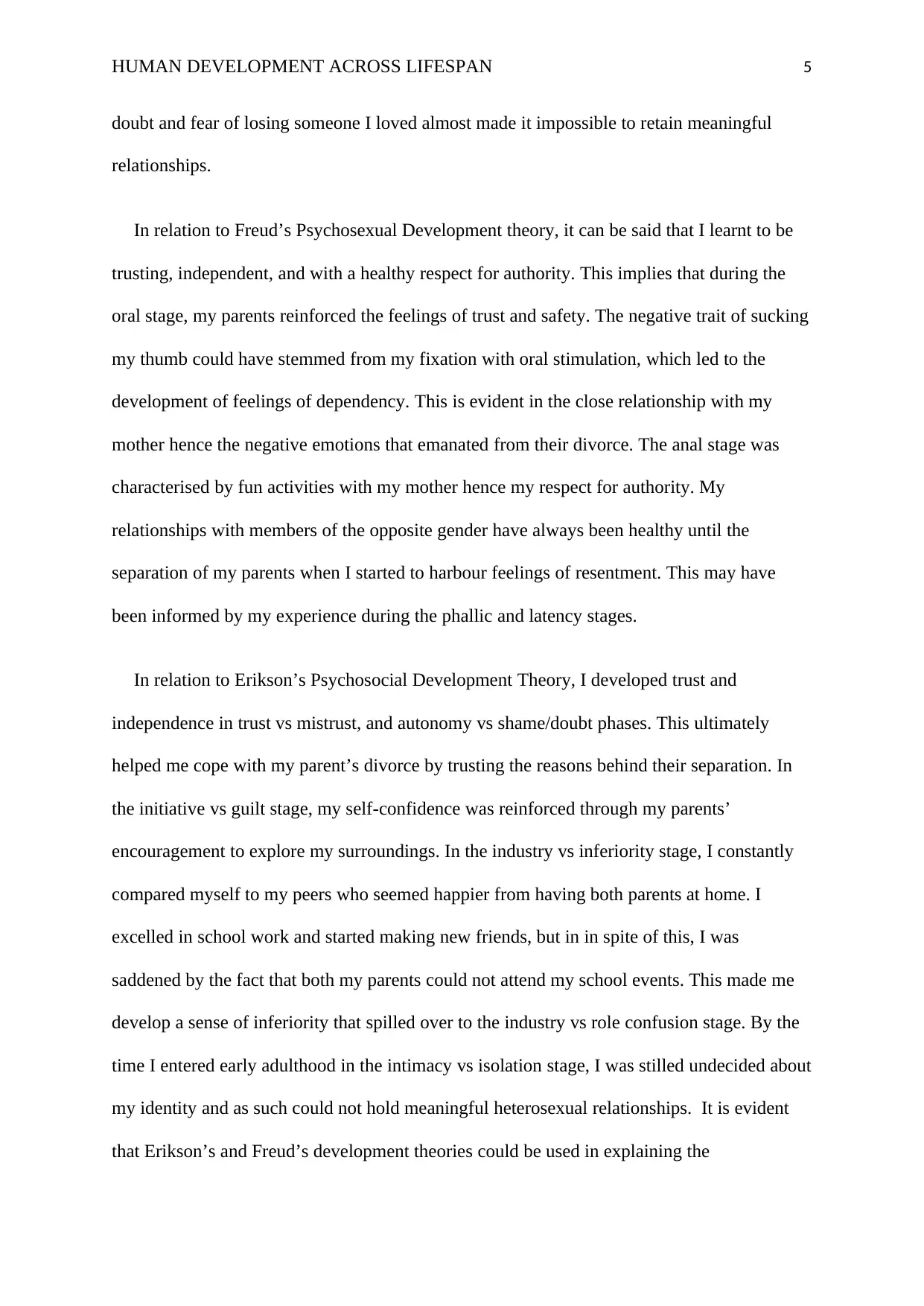
HUMAN DEVELOPMENT ACROSS LIFESPAN 5
doubt and fear of losing someone I loved almost made it impossible to retain meaningful
relationships.
In relation to Freud’s Psychosexual Development theory, it can be said that I learnt to be
trusting, independent, and with a healthy respect for authority. This implies that during the
oral stage, my parents reinforced the feelings of trust and safety. The negative trait of sucking
my thumb could have stemmed from my fixation with oral stimulation, which led to the
development of feelings of dependency. This is evident in the close relationship with my
mother hence the negative emotions that emanated from their divorce. The anal stage was
characterised by fun activities with my mother hence my respect for authority. My
relationships with members of the opposite gender have always been healthy until the
separation of my parents when I started to harbour feelings of resentment. This may have
been informed by my experience during the phallic and latency stages.
In relation to Erikson’s Psychosocial Development Theory, I developed trust and
independence in trust vs mistrust, and autonomy vs shame/doubt phases. This ultimately
helped me cope with my parent’s divorce by trusting the reasons behind their separation. In
the initiative vs guilt stage, my self-confidence was reinforced through my parents’
encouragement to explore my surroundings. In the industry vs inferiority stage, I constantly
compared myself to my peers who seemed happier from having both parents at home. I
excelled in school work and started making new friends, but in in spite of this, I was
saddened by the fact that both my parents could not attend my school events. This made me
develop a sense of inferiority that spilled over to the industry vs role confusion stage. By the
time I entered early adulthood in the intimacy vs isolation stage, I was stilled undecided about
my identity and as such could not hold meaningful heterosexual relationships. It is evident
that Erikson’s and Freud’s development theories could be used in explaining the
doubt and fear of losing someone I loved almost made it impossible to retain meaningful
relationships.
In relation to Freud’s Psychosexual Development theory, it can be said that I learnt to be
trusting, independent, and with a healthy respect for authority. This implies that during the
oral stage, my parents reinforced the feelings of trust and safety. The negative trait of sucking
my thumb could have stemmed from my fixation with oral stimulation, which led to the
development of feelings of dependency. This is evident in the close relationship with my
mother hence the negative emotions that emanated from their divorce. The anal stage was
characterised by fun activities with my mother hence my respect for authority. My
relationships with members of the opposite gender have always been healthy until the
separation of my parents when I started to harbour feelings of resentment. This may have
been informed by my experience during the phallic and latency stages.
In relation to Erikson’s Psychosocial Development Theory, I developed trust and
independence in trust vs mistrust, and autonomy vs shame/doubt phases. This ultimately
helped me cope with my parent’s divorce by trusting the reasons behind their separation. In
the initiative vs guilt stage, my self-confidence was reinforced through my parents’
encouragement to explore my surroundings. In the industry vs inferiority stage, I constantly
compared myself to my peers who seemed happier from having both parents at home. I
excelled in school work and started making new friends, but in in spite of this, I was
saddened by the fact that both my parents could not attend my school events. This made me
develop a sense of inferiority that spilled over to the industry vs role confusion stage. By the
time I entered early adulthood in the intimacy vs isolation stage, I was stilled undecided about
my identity and as such could not hold meaningful heterosexual relationships. It is evident
that Erikson’s and Freud’s development theories could be used in explaining the

HUMAN DEVELOPMENT ACROSS LIFESPAN 6
psychological aspect of coping through divorce, including answering why I exhibited the
reactions I did, as seen in the above reflection.
psychological aspect of coping through divorce, including answering why I exhibited the
reactions I did, as seen in the above reflection.
⊘ This is a preview!⊘
Do you want full access?
Subscribe today to unlock all pages.

Trusted by 1+ million students worldwide
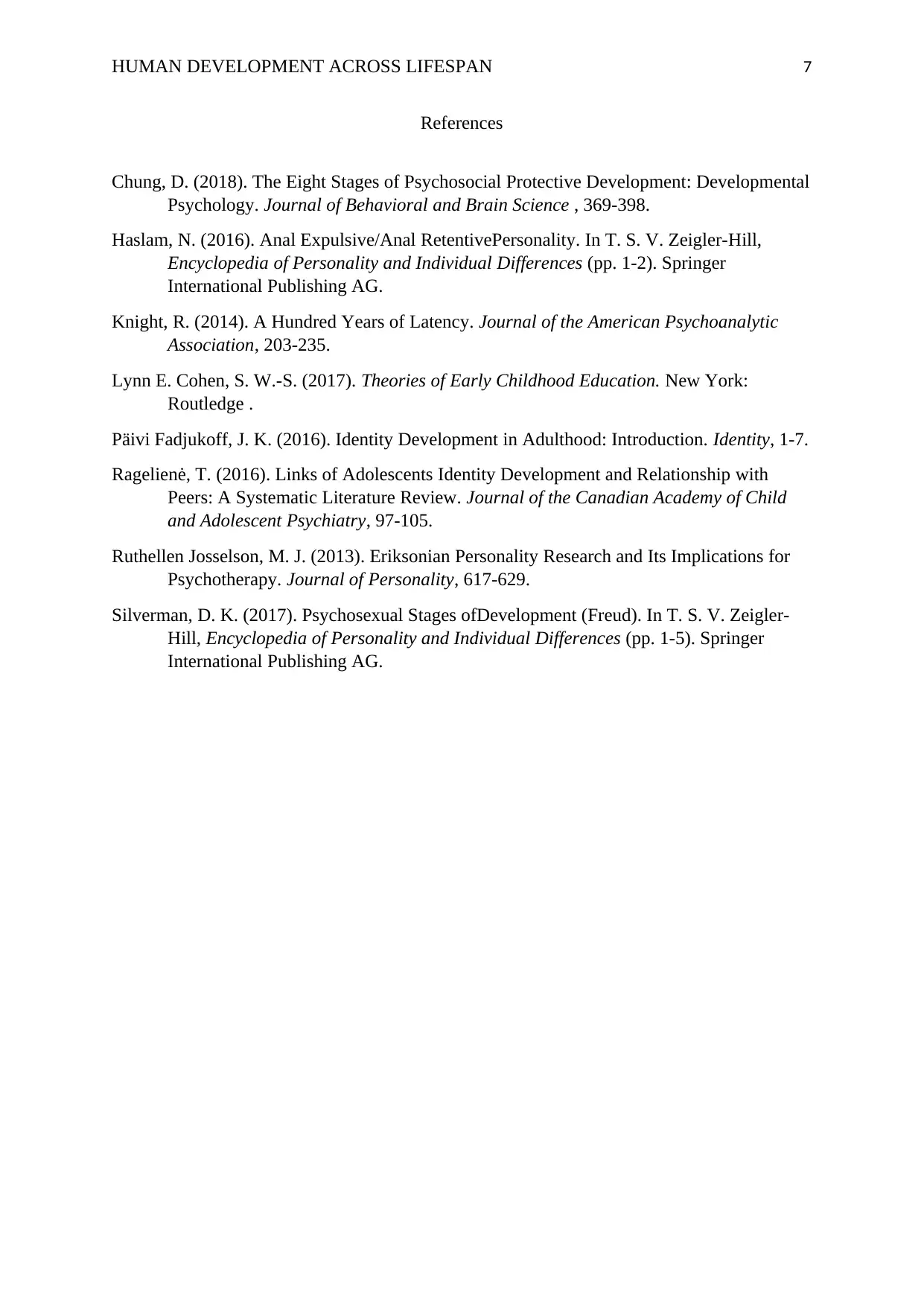
HUMAN DEVELOPMENT ACROSS LIFESPAN 7
References
Chung, D. (2018). The Eight Stages of Psychosocial Protective Development: Developmental
Psychology. Journal of Behavioral and Brain Science , 369-398.
Haslam, N. (2016). Anal Expulsive/Anal RetentivePersonality. In T. S. V. Zeigler-Hill,
Encyclopedia of Personality and Individual Differences (pp. 1-2). Springer
International Publishing AG.
Knight, R. (2014). A Hundred Years of Latency. Journal of the American Psychoanalytic
Association, 203-235.
Lynn E. Cohen, S. W.-S. (2017). Theories of Early Childhood Education. New York:
Routledge .
Päivi Fadjukoff, J. K. (2016). Identity Development in Adulthood: Introduction. Identity, 1-7.
Ragelienė, T. (2016). Links of Adolescents Identity Development and Relationship with
Peers: A Systematic Literature Review. Journal of the Canadian Academy of Child
and Adolescent Psychiatry, 97-105.
Ruthellen Josselson, M. J. (2013). Eriksonian Personality Research and Its Implications for
Psychotherapy. Journal of Personality, 617-629.
Silverman, D. K. (2017). Psychosexual Stages ofDevelopment (Freud). In T. S. V. Zeigler-
Hill, Encyclopedia of Personality and Individual Differences (pp. 1-5). Springer
International Publishing AG.
References
Chung, D. (2018). The Eight Stages of Psychosocial Protective Development: Developmental
Psychology. Journal of Behavioral and Brain Science , 369-398.
Haslam, N. (2016). Anal Expulsive/Anal RetentivePersonality. In T. S. V. Zeigler-Hill,
Encyclopedia of Personality and Individual Differences (pp. 1-2). Springer
International Publishing AG.
Knight, R. (2014). A Hundred Years of Latency. Journal of the American Psychoanalytic
Association, 203-235.
Lynn E. Cohen, S. W.-S. (2017). Theories of Early Childhood Education. New York:
Routledge .
Päivi Fadjukoff, J. K. (2016). Identity Development in Adulthood: Introduction. Identity, 1-7.
Ragelienė, T. (2016). Links of Adolescents Identity Development and Relationship with
Peers: A Systematic Literature Review. Journal of the Canadian Academy of Child
and Adolescent Psychiatry, 97-105.
Ruthellen Josselson, M. J. (2013). Eriksonian Personality Research and Its Implications for
Psychotherapy. Journal of Personality, 617-629.
Silverman, D. K. (2017). Psychosexual Stages ofDevelopment (Freud). In T. S. V. Zeigler-
Hill, Encyclopedia of Personality and Individual Differences (pp. 1-5). Springer
International Publishing AG.
1 out of 7
Related Documents
Your All-in-One AI-Powered Toolkit for Academic Success.
+13062052269
info@desklib.com
Available 24*7 on WhatsApp / Email
![[object Object]](/_next/static/media/star-bottom.7253800d.svg)
Unlock your academic potential
Copyright © 2020–2026 A2Z Services. All Rights Reserved. Developed and managed by ZUCOL.





